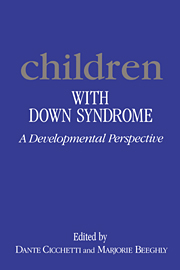Book contents
- Frontmatter
- Contents
- List of contributors
- Preface
- 1 Applying the developmental perspective to individuals with Down syndrome
- 2 An organizational approach to the study of Down syndrome: contributions to an integrative theory of development
- 3 Temperament and Down syndrome
- 4 Interactions between parents and their infants with Down syndrome
- 5 Attention, memory, and perception in infants with Down syndrome: a review and commentary
- 6 Sensorimotor development of infants with Down syndrome
- 7 The growth of self-monitoring among young children with Down syndrome
- 8 Early conceptual development of children with Down syndrome
- 9 Language abilities in children with Down syndrome: evidence for a specific syntactic delay
- 10 Beyond sensorimotor functioning: early communicative and play development of children with Down syndrome
- 11 Peer relations of children with Down syndrome
- 12 Families of children with Down syndrome: ecological contexts and characteristics
- 13 Early intervention from a developmental perspective
- Name index
- Subject index
11 - Peer relations of children with Down syndrome
Published online by Cambridge University Press: 02 November 2009
- Frontmatter
- Contents
- List of contributors
- Preface
- 1 Applying the developmental perspective to individuals with Down syndrome
- 2 An organizational approach to the study of Down syndrome: contributions to an integrative theory of development
- 3 Temperament and Down syndrome
- 4 Interactions between parents and their infants with Down syndrome
- 5 Attention, memory, and perception in infants with Down syndrome: a review and commentary
- 6 Sensorimotor development of infants with Down syndrome
- 7 The growth of self-monitoring among young children with Down syndrome
- 8 Early conceptual development of children with Down syndrome
- 9 Language abilities in children with Down syndrome: evidence for a specific syntactic delay
- 10 Beyond sensorimotor functioning: early communicative and play development of children with Down syndrome
- 11 Peer relations of children with Down syndrome
- 12 Families of children with Down syndrome: ecological contexts and characteristics
- 13 Early intervention from a developmental perspective
- Name index
- Subject index
Summary
The significance of peer relations for psychological development and mental health was recognized years ago by some eminent theorists. Piaget (1932) assigned a critical role to peer relations in his theory of cognitive development. According to him, peer interaction exposes the child to diverse viewpoints, including some that differ from those held by his or her parents. The cognitive conflict induced by such exposure facilitates transition from one level of cognitive development to the next. Furthermore, within the more egalitarian context of the peer system, it is easier for the child to examine, analyze, and reflect on the nature and bases of social rules. It is such critical analysis and reflection, Piaget hypothesized, that brings about the realization that social intercourse and order are based on reciprocal exchanges between people.
Relations with peers were also deemed essential for optimal personality development and psychological adjustment by personality theorists. Adler (1930) asserted that the greatest personal growth occurs in an environment where positive interpersonal relations enhance a child's intrinsic social feelings and make him or her comfortable. Children who feel that they are part of a group will empathize and cooperate with others, thereby contributing to the well-being of the group; those who feel left out may perceive themselves as inferior and engage in maladaptive behavior in order to prove their own worth. To Sullivan (1953), peer relations permitted the developing child to define his or her sense of self and to learn modes of relating required for successful adult relations. More specifically, Sullivan considered friendships important because, unlike the parent-child relationship, they tend to be egalitarian and therefore more conducive to the emergence of mutuality and intimacy in a relationship.
- Type
- Chapter
- Information
- Children with Down SyndromeA Developmental Perspective, pp. 369 - 398Publisher: Cambridge University PressPrint publication year: 1990
- 11
- Cited by



